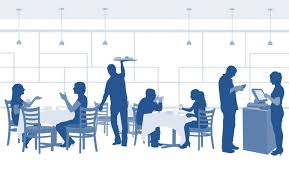Restaurant Management Software

A restaurant management system is a collection of tools and software that helps you operate your food business – Restaurant, Bar, Bakery, Cafe, Cloud Kitchen, or Delivery business. It has a POS (Point of Sale) system as a central unit. Along with tools that help build your online presence, take online orders, accept table bookings, manage your phone calls, manage billing, streamline inventory, send marketing campaigns, run loyalty programs, report on success metrics and give actionable analytics. All this while integrating with your existing restaurant technology systems (like your accounting and employee management software) and with open APIs that let you integrate with any third party tool. Phew!
With so many different functions, it is very important to consider the must-have features for a restaurant management system. After all, it needs to be capable of handling nearly every core function of a restaurant.
This can be a significant investment. And it can be costly to overhaul your restaurant management system everytime your requirements grow. You need a system that is designed with future requirements in mind. This means feature packed and integrations.
The restaurant management system is at the center of your restaurant’s operations and can play a huge role in its success. Therefore, it is one of the most critical decisions when it comes to ensuring a smooth restaurant operation. And this lets you focus on the things that really matter. The food and the service.
So here’s a compilation of the features that are a must for best restaurant management systems. To arm you with all that you need to consider when you evaluate the hardware, software and technology that is right for your food business.
Key features of restaurant management system:
- Ease of operations
- Point-of-Sale Operations
-
Analytics and reporting
Analytics gives you visibility into key areas of your operation and is arguably the most defining feature of a restaurant management software. You can use analytics to know which problems to attack first. And analytics starts with the data that you collect.
- Tracking restaurant finances
- Costs & Profits – Profits are among the top priorities for any restaurant. An accurate picture of your profits comes from a stringent recording of your bill payments. Combined with a measurement of your costs. We have seen restaurants struggle with figuring out their food costs because fixed costs are well, fixed. And tracking menu items, waste and theft, can get complicated. What happens when you bought x quantity of an ingredient and according to the recipes that you pre-save on your inventory management system, you are supposed to be left with y quantity but instead you are left with z? You can see that it gets tricky. As mentioned before, a robust restaurant management system that has a good inventory tracking system, lets you measure the true cost of food. Once you have the costs, calculating profit is easy.
- Sales – Your restaurant handles many payment transactions in a day. A gap here can lead to serious difficulty in figuring out the profitability. Also, a good picture of your sales data allows you to know your top selling menu items, best outlets and the servers who sell more. You can then focus on your top performers while isolating your weaknesses. Tracking you sales data to the tee, is one of the most important functions of your restaurant management system.
- Taxes – A restaurant deals with many categories of taxes, depending on where you operate. There’s the state level tax, a VAT (Value added tax), a service charge. There could be a variety of other taxes depending on your local tax laws. Managing tax can be a hassle, especially if you are multi-outlet and operate across geographies. Your tax computations need to flow to your accounting software to leave you with the right data to run your business on.